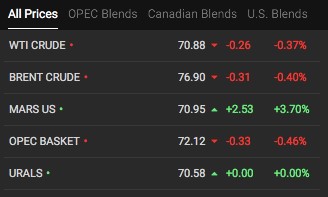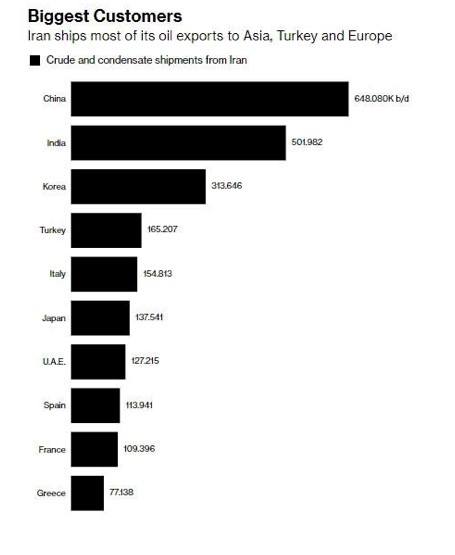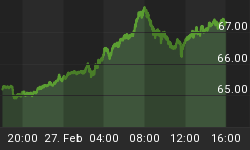Saudi Arabia’s main geopolitical goal right now is to cripple Iran’s ability to fight proxy wars in Yemen and Syria, and oil prices are its weapon—but sometimes that backfires when you’ve got a massively ambitious “Vision 2030” to fund and an Aramco IPO to boost prices for.
From that perspective, the Saudis didn’t mind the oil-price crash that started in mid-2014. Now that Trump has withdrawn from the Iran nuclear deal, and vowed to initiate new sanctions, the Saudis get to have their cake and eat it, too. (All in all it’s been a banner year for the Saudis with sanctions against Russia, with whom they also compete for market share, and now potential new sanctions on Iran).
As the third-largest producer in OPEC, Iran produces about 2.5 million barrels a day on average, or roughly 3 percent of global demand. Sanctions would mean—again, in theory—that Iran’s production could be significantly reduced.
The Saudis might think this is the perfect way to stifle Iran and produce more themselves, while still maintaining their commitment OPEC-agreed cuts.
Of course, for the moment, oil prices are soaring—but that’s not because of true fundamentals, it’s all speculation as the market catches up to the logistics on the ground.

Once the dust settles, though, are things really going to unfold in a way that decimates Iran’s crude exports?
“Saudi officials want to limit Iran’s oil market … This is a fight over controlling the crude market,” Iranian Deputy Oil Minister Amirhossein Zamaninia said earlier this week. Related: New Rules Challenge Social Media Censorship
But he’s confident that it’s not going to work out as swimmingly as the Saudis think. Here’s why:
Iran exports the bulk of its oil to Asia, Turkey and Europe.

(Click to enlarge)
The Asia factor brings up an interesting point and comes at an interesting time: Not only will China likely oppose the U.S. move against Iran, but it’s also just launched trading in yuan-denominated crude oil contracts.
In other words, the Saudis might not be getting their hands on Iran’s coveted Asia market share.
And it’s not just about the yuan contracts, either. We’ve been down this sanctions road before and it largely just blocks oil deals in US dollars, which in turn just helps to chip away at the dominance of the ‘petro-dollar’. Again—a big potential boost for the ‘petro-yuan’, which could easily gain traction on the back of the Iran drama.
Related: Tech Stocks Face Off For Hardware Dominance
It’s not a foregone conclusion that Trump’s move will result in a decline in Iranian crude production any time soon, so the market is reacting prematurely, pushing oil prices up to levels that are not supported by fundamentals.
No one even knows yet how much Iran oil could end up be taken off the market because chances are that China won’t comply (unless it’s getting something from the U.S. in return, like an end to the looming trade war), and Europe may or may not be game. Turkey would also have to be ‘incentivized’.
China could end up buying even more Iranian oil because it might come with a discount.
When the Obama administration slapped sanctions on Iran, oil shipments fell by 1-1.5 million bpd; but this time around analysts are eyeing a much smaller drop of around 300,000-500,000 bpd. But, again, it wouldn’t happen right away—and we won’t know anything for at least 180 days, which is the grace period for sanctions.
By Josh Owens for Safehaven.com
More Top Reads From Safehaven.com:
















